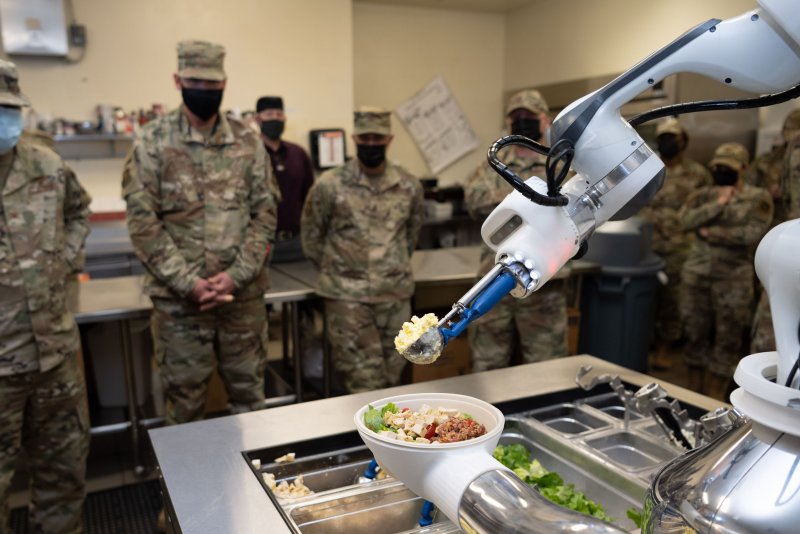WHERE WERE BATMAN & ROBIN

The 60th Mission Support Group leadership watch “Alfred,” an automated food preparation robot, prepare salad at the Travis Air Force Base in California. Photo by Chustine Minoda/U.S. Air Force
Dec. 28 (UPI) -- California's Travis Air Force Base's Monarch dining facility has become the first in the Department of Defense to acquire an automated food preparation robot called "Alfred," according to officials at the base.
"Alfred," which uses hygienic robot arms to automate food preparation activities, was designed and created by Dexai Robotics, a Boston-based startup company, to reduce food waste and lower risks of viral transmissions amid the COVID-19 pandemic, Travis AFB said in a press release.
The Boston-based startup was contracted by the Defense Logistics Agency.
"As are are the first in the DOD to receive this revolutionary robotics technology, the main purpose for 'Alfred' is proof of concept," Maj. Hewko Tyler, 60th Force Support Squadron operations officer, in the release.
RELATED Navy tests Saildrone for first time in Digital Horizon exercise off Jordan's coast
"Will 'Alfred' be able to provide the reduction in food waste, improvements in sanitation and manning benefits as projected? We are excited to find out and be on the forefront of the future of food service," Tyler said.
Tech Sgt. Hurtado emphasized the benefit of freeing up an individual's time for other tasks.
"I think the military can benefit from something of this sort," Hurtado said.
"The Airmen are tasked with so many things every single day as far as getting the mission done, training, taking leave, and focusing on our families. We get pulled in so many different directions that anywhere we can free up some time is a benefit to us," Hurtado said.
Travis AFB has previously experimented with new robotic systems.
Last year, it launched the first drone-based perimeter security system on an Air Force installation.
Other bases have also experimented more recently with other new forms of robotics.
Earlier this year, semi-autonomous machines designed on four legs to resemble security dogs began guarding remote areas of Tyndall Air Force Base, Fla.
Officials said the quad-legged unmanned ground vehicles were not meant to replace military dogs, but to add another layer of protection at the base.

The 60th Mission Support Group leadership watch “Alfred,” an automated food preparation robot, prepare salad at the Travis Air Force Base in California. Photo by Chustine Minoda/U.S. Air Force
Dec. 28 (UPI) -- California's Travis Air Force Base's Monarch dining facility has become the first in the Department of Defense to acquire an automated food preparation robot called "Alfred," according to officials at the base.
"Alfred," which uses hygienic robot arms to automate food preparation activities, was designed and created by Dexai Robotics, a Boston-based startup company, to reduce food waste and lower risks of viral transmissions amid the COVID-19 pandemic, Travis AFB said in a press release.
The Boston-based startup was contracted by the Defense Logistics Agency.
"As are are the first in the DOD to receive this revolutionary robotics technology, the main purpose for 'Alfred' is proof of concept," Maj. Hewko Tyler, 60th Force Support Squadron operations officer, in the release.
RELATED Navy tests Saildrone for first time in Digital Horizon exercise off Jordan's coast
"Will 'Alfred' be able to provide the reduction in food waste, improvements in sanitation and manning benefits as projected? We are excited to find out and be on the forefront of the future of food service," Tyler said.
Tech Sgt. Hurtado emphasized the benefit of freeing up an individual's time for other tasks.
"I think the military can benefit from something of this sort," Hurtado said.
"The Airmen are tasked with so many things every single day as far as getting the mission done, training, taking leave, and focusing on our families. We get pulled in so many different directions that anywhere we can free up some time is a benefit to us," Hurtado said.
Travis AFB has previously experimented with new robotic systems.
Last year, it launched the first drone-based perimeter security system on an Air Force installation.
Other bases have also experimented more recently with other new forms of robotics.
Earlier this year, semi-autonomous machines designed on four legs to resemble security dogs began guarding remote areas of Tyndall Air Force Base, Fla.
Officials said the quad-legged unmanned ground vehicles were not meant to replace military dogs, but to add another layer of protection at the base.
No comments:
Post a Comment